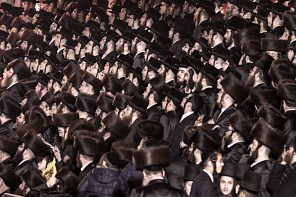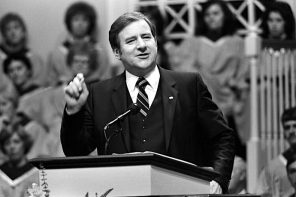The New York Times, the gray champion of moderate reform, has done the impossible: they’ve found a Gandhi scholar who managed to make the Mahatma, our greatest hero of radical resistance, endorse the critics of Occupy Wall Street.
“Gandhi did not believe in enemies: he worked on the premise that solutions emerged only from cooperation,” writes Ian Desai in a recent Times op-ed. He goes on to claim that Gandhi’s slogan would have been “We are the 100%”—which is, like so much of the piece, both true and deceptive.
Gandhi certainly did not believe in enemies. He started from the premise that all humanity, indeed all existence, is one. His program of satyagraha (nonviolent resistance to every form of evil) called for every action to aim for the well-being of everyone.
But he recognized that some people act against universal well-being; most often people who are selfishly out to enrich themselves at the expense of the rest of us. While Gandhi called us to love even the most selfish, he called us equally strenuously to resist their destructive behavior. Sure, he tried to evoke their cooperation and was happy when he got it, but he knew that he wasn’t likely to without a long, arduous program of satyagraha.
Gandhi abhorred the idea of cooperating with injustice of any kind; he would rather have died. So he dedicated his life to the belief that lasting solutions to humanity’s problems come from non-cooperation with injustice. And he called us to actively obstruct the workings of unjust systems—to clog the machine with our bodies, as his hero Thoreau put it.
Far from cooperating with the Wall Street machine, then, Gandhi would have us occupy it quite literally, bringing thousands to make it physically impossible for the tycoons, hedge fund managers, and stock and bond traders to perpetrate their outrages on the rest of us.
Of course the Mahatma knew that the authorities, the hired hands of the 1%, would use violence against satyagrahis. At that point he would say, “We are the 100%. We are here to bring well-being and prevent harm to all. No one is an enemy.” From this premise of universal love he derived his teaching of strict nonviolence: even when they beat, gas, and pepper spray you—even when they come to kill you—do them no harm and wish them no harm. But do whatever it takes, nonviolently, to stop their actions, which harm them as well as the rest of us.
Strict nonviolence is a hard teaching, to be sure, and one that is open to debate. But there’s no question that it’s far different from the bland cooperation with injustice that Desai advocates in the Mahatma’s name.
Desai then proceeds to state another Gandhian principle accurately only to, yet again, draw the wrong conclusion. Because all humanity is one, we all share responsibility for the way things are and for making them better, or, in the case of Occupy Wall Street: “drastic income inequality in America today is here because Americans collectively allow it to be here.” Gandhi couldn’t agree more. And, as Desai rightly says, Gandhi had little time for blame and finger-pointing. He urged people to stop dwelling on what the “bad guys” were doing and start setting things right themselves.
But the Mahatma would have been amazed at the conclusion Desai draws: Dismantle the occupations and fan out to establish “community centers, schools, shelters, charities” everywhere. That’s a subtle distortion of Gandhi’s program of “constructive work.” It had nothing to do with charity and everything to do with creating alternative economic and social institutions while actively resisting the dominant, dominating institutions.
Where better to start brainstorming and experimenting for a new society than in Zuccotti Park and the dozens of other urban spaces where occupiers are building real 24/7 communities? Split those communities up into little teams of volunteers and their creative energy would soon be gone, which is no way to fulfill our responsibility to transform a society that is unjust in so many ways.
Desai repeats the oft-heard criticism that occupiers have failed to “adopt goals, define their strategy, and communicate these to their opponents and the broader public.” Gandhi had the luxury of facing one huge evil—the British occupation of India—just as earlier U.S. social movements organized around resisting racial segregation or the war in Vietnam. One big target does have its advantages.
But Gandhi saw his opposition to British rule as merely one part of his larger program of “constructive work.” (Here again Desai errs, claiming that “the more mature” Gandhi shifted his focus from politics to constructive work; in fact the Mahatma never separated the two.) And for most of the constructive program Gandhi had goals that were as diffuse and ill-defined as the Occupy movement. He knew only that the people of India had to lift themselves—all of them—out of immiserating poverty by their own initiative, determination, and hard work. Exactly how it would be done was left to endless experimentation.
Indeed, Gandhi summed up his whole life in the title he chose for his autobiography: The Story of My Experiments With Truth. He believed firmly that truth can be found only through the open-minded attitude of experimentation—which means that truth, insofar as any human can grasp it, is inherently fluid. Today’s fixed set of demands may easily seem like tomorrow’s folly.
Gandhi’s program was especially vague in the earliest years of his work, in South Africa. To demand a detailed list of specifics from today’s Occupiers would be like making the same demand of Gandhi in the 1890s.
Yet Gandhi must have known intuitively, even then, an essential truth he would later articulate clearly: The greatness of any society is not measured by its gross product, nor by the stellar achievements of its privileged few. The measure of greatness is the way a society treats the poorest, weakest, most marginalized of its people. That same truth—both a thought and a feeling—seems to lie at the heart of the Occupy movement. And the heart of Gandhi’s teaching was the call to take personal responsibility, to risk everything, in unceasing direct nonviolent action until your society achieves greatness.




